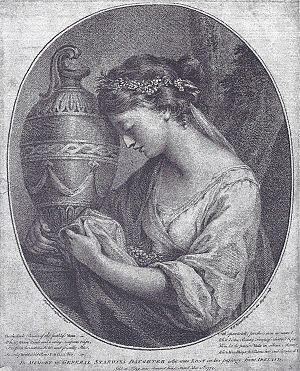Anne Hunter facts for kids
Quick facts for kids
Anne Hunter
|
|
|---|---|

Anne Home as The Pensive Muse, before her marriage to John Hunter. Engraving by W. W. Ryland, after a lost portrait by Angelica Kauffman, 1767.
|
|
| Born | 13 March 1742 |
| Died | 7 January 1821 |
| Nationality | United Kingdom of Great Britain and Ireland |
| Known for | poetry, bluestocking |
| Spouse(s) | John Hunter |
Anne Hunter (born Anne Home) lived from 1742 to 1821. She was a talented poet and hosted popular gatherings called "salons" in London during the Georgian era. She is best known for writing the words (lyrics) for at least nine of the famous composer Joseph Haydn's English songs. Anne was married to John Hunter, a very important surgeon and scientist. His amazing collection of anatomical items, which he kept at their home, later became the start of the famous Hunterian Museum. Anne also welcomed many important women writers and thinkers, known as "Bluestockings," to her home.
Contents
Who Was Anne Hunter?
Anne Hunter was born Anne Home on March 13, 1742, in Waterford. She was the oldest daughter of Robert Boyne Home, who was also a surgeon. Her family lived in Greenlaw Castle in Berwickshire.
In July 1771, Anne married John Hunter, who was one of the most respected scientists and surgeons of his time. Anne's brother, Everard Home, even became a surgeon by learning from her husband.
Anne's Famous Gatherings
Anne Hunter was known for hosting lively and enjoyable "salons" at her home. These were social gatherings where important people, especially writers and thinkers, would meet to discuss ideas.
Some of her close friends were famous "Bluestockings." These were women who were known for their intelligence and interest in literature and learning. Among her friends were Elizabeth Carter, Mary Delany, and Elizabeth Montagu.
Anne's home was a place where new ideas were shared. She even inspired a young writer named Joanna Baillie, who later became a serious poet and playwright.
Life After John Hunter
When John Hunter passed away in 1793, Anne was left without much money. For a while, she received help from the Queen and a kind doctor named Maxwell Garthshore. She also sold some of her husband's belongings, like his furniture and books.
Later, her son-in-law, Sir James Campbell of Inverneill, gave her a small yearly income. In 1799, the government voted to give her £15,000 for her husband's amazing collections. This money finally made her financially stable. These collections eventually became the Hunterian Museum in London.
Anne and John Hunter had four children. Two of them, a son and a daughter, lived longer than Anne. She lived a quiet life in London until she passed away on January 7, 1821.
Anne Hunter's Poetry and Songs
Anne Hunter was a talented poet from a young age. One of her early poems, "Flower of the Forest," was published in an Edinburgh magazine called The Lark in 1765.
Later, she wrote "Sports of the Genii" in 1797. This was for a series of beautiful drawings by Susan Macdonald, the daughter of a judge. Her poems for these drawings showed her sense of humor and imagination.
In 1802, Anne published a collection of her poems. It was so popular that a second edition was printed the very next year. A magazine called British Critic said that her poems might not be very deep, but they had a natural feeling and were simply expressed. This made them enjoyable to read.
Working with Joseph Haydn
Anne Hunter is especially famous because the great composer Joseph Haydn used her words for many of his songs. Even though Haydn visited England when Anne was a widow, their connection is still a bit of a mystery.
Some of the well-known songs by Haydn that feature Anne Hunter's lyrics include:
- "My Mother bids me bind my Hair" (which was originally written for a tune by another composer, Ignaz Pleyel)
- "The Mermaid's Song"
- "Fidelity"
- "Pleasing Pain"
- "The Spirit's Song"
She also wrote a libretto (the text for a musical work) for Haydn's famous oratorio The Creation. This work was based on John Milton's epic poem Paradise Lost.
Images for kids
-
Anne Home as The Pensive Muse, before her marriage to John Hunter. Engraving by W. W. Ryland, after a lost portrait by Angelica Kauffman, 1767.
 | Aaron Henry |
 | T. R. M. Howard |
 | Jesse Jackson |


